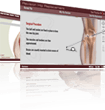Infection Precautions
Any infection in the body can spread from one area to another through the blood stream. This is a difficult problem if infection spreads to your artificial joint. This can occur many years after surgery and you should seek prompt attention if you develop an infection. Your dental health is important. You should perform effective daily oral hygiene procedures (brushing, nossing, and irrigation).
All total joint replacement patients are placed on antibiotic therapy during their surgery and for several days postoperatively. This is done to prevent infection. Fortunately, less than one out of every 500 patients develop an infection around their joint replacement during hospitalization.
Infections occurring afier six months are usually the result of an infection occurring elsewhere in the body which then spreads to the joint. Urinary tract, skin, dental or respiratory infections are potential causes for infection in the new implant. Infections in other parts of the body should therefore be treated aggressively in an attempt to avoid their spread to the joint.
We recommend prophylactic antibiotics for patients having any dental work done (including cleaning) and for any invasive diagnostic studies. This prevention is recommended for as long as you have the implant.
Prophylaxis should by considered for patients with total joint replacement that meet the following criteria. Please provide this information to your dentist if needed:
- Dental extractions
- Periodontal procedures including surgery, subgingival placement of antibiotic fibers/strips, scaling and root planing, probing, recall maintenance
- Dental implant placement and reimplantation of avulsed teeth
- Endodontic (root canal) instrumentation or surgery
- Intraligamental local anesthetic injections
- Prophylactic cleaning of teeth or implants where bleeding is anticipated
Suggested antibiotic prophylaxis regimens
- Patients not allergic to penicillin: cephalexin, cephradine or amoxicillin: 2 grams orally 1 hour prior to dental procedure.
- Patients not allergic to penicillin and unable to take oral medications: cefazolin 1 gram or ampicillin 2 grams IM/IV 1 hour prior to the procedure.
- Patients allergic to penicillin: clindamycin: 6OO mg orally 1 hour prior to the dental procedure.
- Patients allergic to penicillin and unable to take oral med-ications: clindamycin 6OO mg IM/IV 1 hour prior to the procedure.
Important: No second doses are recommended for any of these dosing regimens.
| Back to Main Page |













